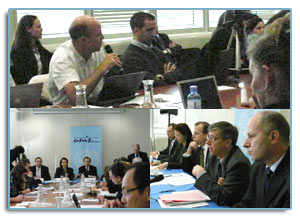Report on UNIS Vienna Journalist Forum 2009: "Banning Nuclear Tests: The Road Ahead"
UNIS Vienna's 2009 Journalist Forum "Banning Nuclear Tests: The Road Ahead" attracted more than 45 participants, mainly journalists from Bucharest, Budapest, Bratislava, Vienna and Warsaw. The half-day forum which was held on 9 November brought together media, government representatives and experts to discuss the outcome of recent high level meetings on the Comprehensive Nuclear Test-Ban-Treaty in New York on 24 September 2009 and new prospects for entry into force brought about by a changed leadership in Washington.
In his introductory remarks, UNIS Director Maher Nasser spoke about the context in which the day's discussions were taking place and the reason behind the choice of this topic. Quoting from the statement of Secretary-General Ban Ki-moon at the Conference on Facilitating the Entry into Force of the CTBT at UN Headquarters in New York on 24 September, he said that the disarmament issue was now more relevant than ever before. There was a need to build on the new momentum to create a world free of nuclear weapons.
With increased interest in reporting on this issue and in the work of the CTBTO, UNIS Vienna hoped that the day's deliberations and information material distributed at the meeting would create better awareness and more informed reporting on disarmament and the work of the CTBTO Prepcom, particularly as the CTBT is a fundamental building block for a world free of nuclear weapons.

Maher Nasser, who chaired and moderated the event then introduced the distinguished speakers who included Counsellor Lucien Scotti, Permanent Mission of France to the United Nations (Vienna), who spoke on behalf of France and Morocco as the coordinators of the entry into force process of the CTBT and Ambassador Glyn T Davies, Permanent Representative of the United States of America to the United Nations (Vienna) who spoke about the shift in US policy and its impact on the CTBT. The other two speakers were Tarik Rauf, Head, Verification and Security Policy Coordination at the International Atomic Energy Agency (IAEA) and Annika Thunborg, Spokesperson CTBTO.
Counsellor Lucien Scotti elaborated on the work done by Morocco and France as the Chairpersons of the Conference guiding the CTBT's entry into force as well as the work ahead. He said France was a strong supporter of the treaty and has been providing strong financial and technical support to the secretariat. No nuclear test could go undetected he said, because of the monitoring system established by the CTBT secretariat. He explained that Article 14 of the treaty deals with its entry into force and how the 44 countries listed in Annex 2 have to ratify the treaty before entry into force is possible. Of these, 35 have ratified, leaving just 9 States which have not.
The work ahead he said was to keep the political momentum going and keep discussing the treaty with the remaining Annex 2 States which needed to ratify the treaty.
The Ambassador of the United States to the United Nations in Vienna, Glyn T. Davies, said that the CTBT was the keystone of the architecture to build a world without nuclear weapons. Ambassador Davies spoke at length on the shift in policy as set out by the United States President in his speech in Prague earlier in the year. Ambassador Davies said the President Obama was aggressively pursuing ratification of the CTBT. For the first time in 10 years, the United States attended the Article 14 Conference in New York where the US Secretary of State had spoken of the difficult road ahead and how ratification would not be easy but it would enhance the security of the American people.
In conclusion Ambassador Davies said: "We need to work together to turn the momentum the US had generated into action."
The Head of the Verification and Security Policy Coordination at the International Atomic Energy Agency (IAEA), Tariq Rauf said it was high time that the CTBT came into force. There was also a need he said, for a treaty to ban production of fissile material for nuclear weapons. The single most important barrier to developing nuclear weapons was access to nuclear material -highly enriched uranium and plutonium - so if the IAEA could verify such material was in peaceful use, it could also verify that it had not been diverted or misused for making nuclear weapons.
In terms of working towards a world free of nuclear weapons, the dynamics had changed, he said, with President Obama's speech in Prague. "We seem to be at a hopeful moment and there is optimism that things are moving in the right direction," he said.
CTBTO spokesperson, Annika Thunborg said it was an interesting situation that though the CTBT has not yet entered into force, the monitoring and verification regime had been built up and was almost complete and operational. She pointed out that the next year would be very significant for the CTBT with the Nuclear Non-Proliferation Conference in New York in May - the previous review conference in 2005 failed with no final declaration. "If we do not reach an agreement on the CTBT, there cannot be a successful outcome to the NPT conference," she said.
An important study was being carried out by the United States National Academy of Science at the request of President Obama - an update of the technical issues related to the CTBT, which looked at how well the verification regime worked and the sustainability of the US nuclear stockpile. The report would be published in the next few months.
Following the Forum, participants were invited for lunch and an optional guided tour of the Vienna International Centre.
For CTBTO's report and audio of the event please go to: The Comprehensive Nuclear-Test-Ban Treaty for Journalists: The Road Ahead